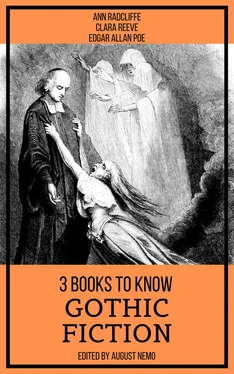‘I know not how I have deserved that character of the marchioness,’ said the count with a smile, ‘but that heart must be either fickle or insensible in an uncommon degree, which can boast of freedom in the presence of lady Julia.’ The marchioness, mortified by the whole conversation, now felt the full force of Vereza’s reply, which she imagined he pointed with particular emphasis.
The entertainment concluded with a grand firework, which was exhibited on the margin of the sea, and the company did not part till the dawn of morning. Julia retired from the scene with regret. She was enchanted with the new world that was now exhibited to her, and she was not cool enough to distinguish the vivid glow of imagination from the colours of real bliss. The pleasure she now felt she believed would always be renewed, and in an equal degree, by the objects which first excited it. The weakness of humanity is never willingly perceived by young minds. It is painful to know, that we are operated upon by objects whose impressions are variable as they are indefinable — and that what yesterday affected us strongly, is to-day but imperfectly felt, and to-morrow perhaps shall be disregarded. When at length this unwelcome truth is received into the mind, we at first reject, with disgust, every appearance of good, we disdain to partake of a happiness which we cannot always command, and we not unfrequently sink into a temporary despair. Wisdom or accident, at length, recal us from our error, and offers to us some object capable of producing a pleasing, yet lasting effect, which effect, therefore, we call happiness. Happiness has this essential difference from what is commonly called pleasure, that virtue forms its basis, and virtue being the offspring of reason, may be expected to produce uniformity of effect.
The passions which had hitherto lain concealed in Julia’s heart, touched by circumstance, dilated to its power, and afforded her a slight experience of the pain and delight which flow from their influence. The beauty and accomplishments of Vereza raised in her a new and various emotion, which reflection made her fear to encourage, but which was too pleasing to be wholly resisted. Tremblingly alive to a sense of delight, and unchilled by disappointment, the young heart welcomes every feeling, not simply painful, with a romantic expectation that it will expand into bliss.
Julia sought with eager anxiety to discover the sentiments of Vereza towards her; she revolved each circumstance of the day, but they afforded her little satisfaction; they reflected only a glimmering and uncertain light, which instead of guiding, served only to perplex her. Now she remembered some instance of particular attention, and then some mark of apparent indifference. She compared his conduct with that of the other young noblesse; and thought each appeared equally desirous of the favor of every lady present. All the ladies, however, appeared to her to court the admiration of Vereza, and she trembled lest he should be too sensible of the distinction. She drew from these reflections no positive inference; and though distrust rendered pain the predominate sensation, it was so exquisitely interwoven with delight, that she could not wish it exchanged for her former ease. Thoughtful and restless, sleep fled from her eyes, and she longed with impatience for the morning, which should again present Vereza, and enable her to pursue the enquiry. She rose early, and adorned herself with unusual care. In her favorite closet she awaited the hour of breakfast, and endeavoured to read, but her thoughts wandered from the subject. Her lute and favorite airs lost half their power to please; the day seemed to stand still — she became melancholy, and thought the breakfast-hour would never arrive. At length the clock struck the signal, the sound vibrated on every nerve, and trembling she quitted the closet for her sister’s apartment. Love taught her disguise. Till then Emilia had shared all her thoughts; they now descended to the breakfast-room in silence, and Julia almost feared to meet her eye. In the breakfast-room they were alone. Julia found it impossible to support a conversation with Emilia, whose observations interrupting the course of her thoughts, became uninteresting and tiresome. She was therefore about to retire to her closet, when the marquis entered. His air was haughty, and his look severe. He coldly saluted his daughters, and they had scarcely time to reply to his general enquiries, when the marchioness entered, and the company soon after assembled. Julia, who had awaited with so painful an impatience for the moment which should present Vereza to her sight, now sighed that it was arrived. She scarcely dared to lift her timid eyes from the ground, and when by accident they met his, a soft tremour seized her; and apprehension lest he should discover her sentiments, served only to render her confusion conspicuous. At length, a glance from the marchioness recalled her bewildered thoughts; and other fears superseding those of love, her mind, by degrees, recovered its dignity. She could distinguish in the behaviour of Vereza no symptoms of particular admiration, and she resolved to conduct herself towards him with the most scrupulous care.
This day, like the preceding one, was devoted to joy. In the evening there was a concert, which was chiefly performed by the nobility. Ferdinand played the violoncello, Vereza the German flute, and Julia the piana-forte, which she touched with a delicacy and execution that engaged every auditor. The confusion of Julia may be easily imagined, when Ferdinand, selecting a beautiful duet, desired Vereza would accompany his sister. The pride of conscious excellence, however, quickly overcame her timidity, and enabled her to exert all her powers. The air was simple and pathetic, and she gave it those charms of expression so peculiarly her own. She struck the chords of her piana-forte in beautiful accompaniment, and towards the close of the second stanza, her voice resting on one note, swelled into a tone so exquisite, and from thence descended to a few simple notes, which she touched with such impassioned tenderness that every eye wept to the sounds. The breath of the flute trembled, and Hippolitus entranced, forgot to play. A pause of silence ensued at the conclusion of the piece, and continued till a general sigh seemed to awaken the audience from their enchantment. Amid the general applause, Hippolitus was silent. Julia observed his behaviour, and gently raising her eyes to his, there read the sentiments which she had inspired. An exquisite emotion thrilled her heart, and she experienced one of those rare moments which illuminate life with a ray of bliss, by which the darkness of its general shade is contrasted. Care, doubt, every disagreeable sensation vanished, and for the remainder of the evening she was conscious only of delight. A timid respect marked the manner of Hippolitus, more flattering to Julia than the most ardent professions. The evening concluded with a ball, and Julia was again the partner of the count.
When the ball broke up, she retired to her apartment, but not to sleep. Joy is as restless as anxiety or sorrow. She seemed to have entered upon a new state of existence; — those fine springs of affection which had hitherto lain concealed, were now touched, and yielded to her a happiness more exalted than any her imagination had ever painted. She reflected on the tranquillity of her past life, and comparing it with the emotions of the present hour, exulted in the difference. All her former pleasures now appeared insipid; she wondered that they ever had power to affect her, and that she had endured with content the dull uniformity to which she had been condemned. It was now only that she appeared to live. Absorbed in the single idea of being beloved, her imagination soared into the regions of romantic bliss, and bore her high above the possibility of evil. Since she was beloved by Hippolitus, she could only be happy.
Читать дальше












